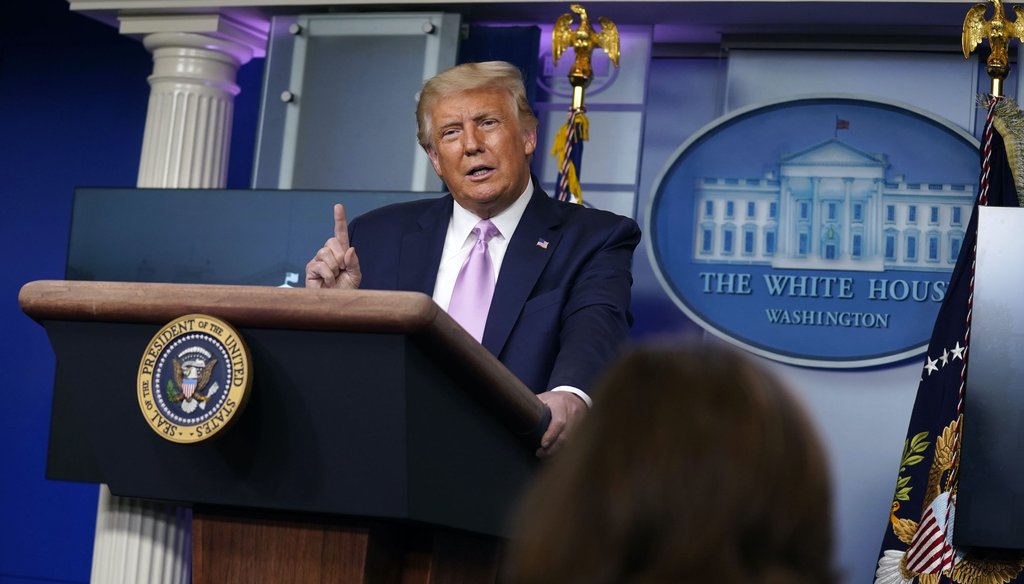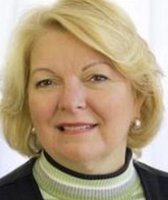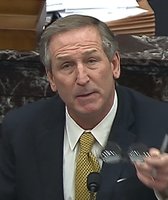Get PolitiFact in your inbox.

President Donald Trump speaks during a news conference at the White House on Aug. 19, 2020, in Washington. (AP)
If Your Time is short
-
President Donald Trump has been asked twice for his thoughts on QAnon, a baseless conspiracy theory about a Satan-worshipping pedophile ring. Both times, he demurred.
-
QAnon emerged in fall 2017. One of its central claims is that Trump and former special counsel Robert Mueller will soon arrest members of the "deep state" for their involvement in pedophile rings, among other offenses.
-
The conspiracy theory has recently become more widespread in American politics and helped drive viral falsehoods on social media. It is linked to several violent crimes and the FBI has said it’s a domestic terrorism threat.
Twice in the past week, reporters have asked President Donald Trump what he thinks about QAnon. The conspiracy theory falsely claims that a cabal of prominent Democrats and movie stars are Satan-worshipping pedophiles.
Twice, Trump has demurred — and even encouraged QAnon followers.
A reporter during an Aug. 19 press conference asked:
"During the pandemic, the QAnon movement appears to be gaining a lot of followers. Can you talk about what you think about that and what you have to say to people who are following this movement right now?"
Trump replied:
"Well I don’t know much about the movement other than I understand they like me very much, which I appreciate. But I don’t know much about the movement. I have heard that it is gaining in popularity and, from what I hear … these are people that don’t like what they’re seeing what’s going on in places like Portland, in places like Chicago and New York and other cities and states. And I’ve heard these are people that love our country and they just don’t like seeing it."
When pressed on whether he supports some of the conspiracy theory’s specific claims — including the assertion that Trump himself is teaming up with former special counsel Robert Mueller to investigate a cult of pedophilic cannibals — the president didn’t say no.
"I haven’t heard that, but is that supposed to be a bad thing or a good thing?" he said. "If I can help save the world from problems, I’m willing to do it. I’m willing to put myself out there."
A Pew Research Center survey published in March found that more than three-fourths of Americans haven’t heard of QAnon. But the recent press conference was the latest instance in which Trump has amplified QAnon.
Trump has also retweeted QAnon-promoting accounts, as have members of the Trump family and campaign staffers. During an Aug. 14 briefing, the president didn’t answer a reporter’s question about the conspiracy theory. Instead, he reiterated his support for Marjorie Taylor Greene, a QAnon supporter who recently won a congressional primary election in Georgia.
But what exactly is QAnon — and how is it different from other kinds of misinformation? Here’s a quick primer.
QAnon takes its name from a 4chan user named "Q," a reference to a security clearance needed for high-level government information. In fall 2017, Q’s cryptic "breadcrumbs" posted on fringe online forums spurred a wide-ranging conspiracy theory embraced by Trump’s supporters.
The central message of QAnon, which evolved from the 2016 Pizzagate conspiracy theory, is unclear. But many followers believe in "The Storm," which is when they claim Trump and Mueller will start arresting former presidents and other members of the "deep state" for their involvement in pedophile rings, among other offenses.
RELATED: QAnon and Donald Trump rallies: What's that about?
On social media, QAnon supporters have helped amplify a viral conspiracy theory about online furniture store Wayfair and a documentary called "Plandemic," which was filled with false claims about COVID-19. QAnon and Pizzagate-supporting accounts co-opted #SaveTheChildren to spread baseless theories about the perpetrators of child sex trafficking.
In response, some technology platforms have taken action.
On Aug. 19, Facebook announced it had removed hundreds of groups that promoted QAnon. The move came after Twitter permanently suspended thousands of accounts associated with QAnon and TikTok blocked searches for the conspiracy theory.
Outlandish claims aside, what makes QAnon different from other conspiracy theories? For starters, the FBI has said it’s a potential domestic terrorism threat.
In a May 2019 intelligence bulletin obtained by Yahoo! News, FBI officials described "conspiracy theory-driven domestic extremists" as a growing threat. The memo mentions QAnon specifically.
"The FBI assesses these conspiracy theories very likely will emerge, spread, and evolve in the modern information marketplace, occasionally driving both groups and individual extremists to carry out criminal or violent acts," the document says.
Our Sources
BBC, "QAnon: TikTok blocks QAnon conspiracy theory hashtags," July 24, 2020
C-SPAN, President Trump News Conference, Aug. 14, 2020
C-SPAN, President Trump News Conference, Aug. 19, 2020
The Daily Beast, "QAnon Believer Teamed Up With Conspiracy Theorists to Plot Kidnapping, Police Say," Jan. 4, 2020
The Daily Beast, "Qanon-Believing Proud Boy Accused of Murdering ‘Lizard’ Brother With Sword," Jan. 9, 2019
The Daily Beast, "QAnon Mom Charged With Kidnapping Her Kids," March 28, 2020
Media Matters for America, "Here are the QAnon supporters running for Congress in 2020," Aug. 20, 2020
Media Matters for America, "Trump has repeatedly amplified QAnon Twitter accounts. The FBI has linked the conspiracy theory to domestic terror." Aug. 20, 2020
NBC News, "QAnon groups have millions of members on Facebook, documents show," Aug. 10, 2020
The New York Times, "Facebook Removes 790 QAnon Groups to Fight Conspiracy Theory," Aug. 19, 2020
The New York Times, "Georgia Republican Primary Runoff Election Results: 14th Congressional District," Aug. 11, 2020
The New York Times, "He Wasn’t Seeking to Kill a Mob Boss. He Was Trying to Help Trump, His Lawyer Says." July 21, 2019
The New York Times, "How the ‘Plandemic’ Movie and Its Falsehoods Spread Widely Online"
The New York Times, "Marjorie Taylor Greene, a QAnon Supporter, Wins House Primary in Georgia," Aug. 11, 2020
The New York Times, "Twitter Takedown Targets QAnon Accounts," July 21, 2020
Pew Research Center, "QAnon’s conspiracy theories have seeped into U.S. politics, but most don’t know what it is," March 30, 2020
PolitiFact, "Fact-checking ‘Plandemic’: A documentary full of false conspiracy theories about the coronavirus," May 7, 2020
PolitiFact, "How Pizzagate went from fake news to a real problem for a D.C. business," Dec. 5, 2016
PolitiFact, "How the Wayfair child sex-trafficking conspiracy theory went viral," July 15, 2020
PolitiFact, "QAnon and Donald Trump rallies: What's that about?" Aug. 3, 2018
PolitiFact, "QAnon, Pizzagate conspiracy theories co-opt #SaveTheChildren," Aug. 12, 2020
The Washington Post, "President Trump has made more than 20,000 false or misleading claims," July 13, 2020
The Washington Post, "Why QAnon supporters are winning congressional primaries," June 13, 2020
Yahoo! News, "Exclusive: FBI document warns conspiracy theories are a new domestic terrorism threat," Aug. 1, 2019




































